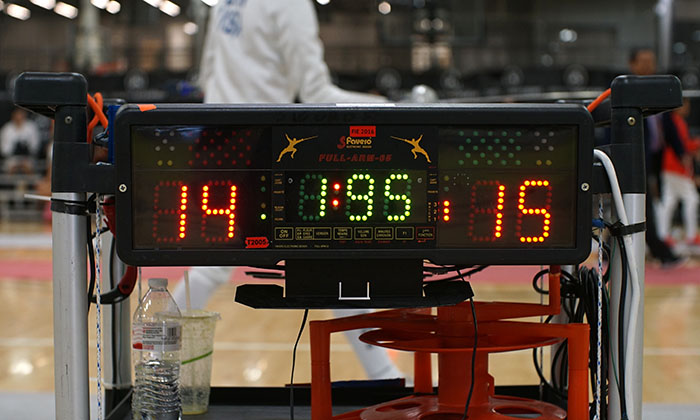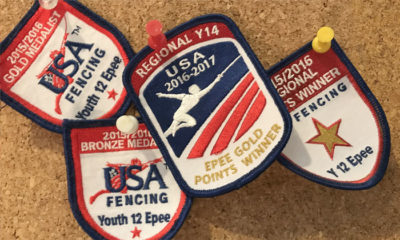
“You can’t win unless you learn how to lose.”
— Kareem Abdul Jabbar
Help your child understand how to lose, and you will help your child win.
I find it interesting that often the first question out of an adult’s mouth after a tournament is, “Did you win?” We are so focussed on winning. I have seen parents really upset when their child loses a bout. I will admit, I have certainly been there. I have had to take a quick walk around the block at a NAC, after watching Stafford blow an 8 point lead and lose. All that money. Flights, hotels, travel expenses. For what? I’ve been so upset. But, I have a great poker face. I’ve developed it out of necessity, because that is what my son needs. He needs to see me shrug my shoulders and say, “Oh, well. No big deal.” It sometimes takes me a minute. Or two. He needs that from me because he is so overwhelmed with disappointment, frustration, and anger at himself. And I see him after he loses. He beats himself up. Nothing I say will ever be as harsh as what he is saying to himself. How do I know that? He told me. When he told me that, I realized I needed to change, to find a way to help him deal with losing. And I started to think about losing. What it means.
Losing is not a dirty word.
In the beginning, Stafford lost all of the time. It wasn’t a question of if, but when. And when he lost, we would talk about why he lost. There were lessons to be learned. We talked about goals more than we talked about winning. I refer to some of them in other blogs. One of them was to stop walking off the end of the strip. The result of accomplishing that goal, was, of course, learning how to defend on the strip, and not giving away points, and of course, that affected the score, and eventually, the fencing got better and the score got better. But the focus was not on winning. Winning is a funny thing. When my son wins, it is, “Yay! I won!” But when he loses, it is, “Why did I lose? What did I do wrong? What do I need to fix? Improve? Change?” Sometimes the issue is mental, or emotional. Sometimes it is technical. Sometimes, it can be all three. When Stafford won Y12 at Summer Nationals in 2016, I was elated. So proud. And after we finished celebrating, one of the first things I said to him was, just remember, you are going to lose again. Eventually. The first tournament after Summer Nationals, he lost. That lesson was an easy one, though it involved emotions and his mental strength. Don’t walk around acting like you are unbeatable, because you are not. And you have a target on your back now. You have to keep focused.
In 2017-18, Stafford really struggled. He had qualified for his first World Cup, but barely, and he really needed to do well in the October NAC in order to have enough points to qualify for the next one. So, what happened? All of that pressure was overwhelming. He fell apart on the strip. I shrugged. I knew how much he wanted it. I knew that we would have to figure out how to deal with the pressure. But how? We talked about it. Then, the same thing happened in November. After a brisk walk around the convention center in Kansas City, I put on my poker face and went in to help my son figure out how to deal with the pressure. This was a much more complicated lesson. And a much more important thing to learn how to deal with than how to stop walking off the end of the strip. It took months. And we tackled it in many different ways, from many different angles. At the March NAC, in the Y14 team event, Stafford’s team took Gold, and he was the team anchor. He also placed fifth in Y14. All of our hard work (mostly his) in tackling how to deal with the pressure started to pay off. This summer in Saint Louis, at Summer Nationals, Stafford took home three medals in four events. There is no way he could have achieved those results without having lost so completely in October and November.
I know this sounds crazy, but appreciate all of those losses, and make them mean something. As your child progresses in fencing, fencing itself gets more sophisticated, and the pressure gets intense. In Y10, a child just has to show up at a regional event to qualify for Summer Nationals, and they are guaranteed to get out of pools and experience at least one Direct Elimination bout through Y14. But everything changes in Cadet. The bottom 20% out of pools get eliminated and don’t even make it to the DEs. Everything gets much more competitive, and much more stressful. Helping your child through those early losses, helping him find a way to make his fencing stronger, or helping her control her emotions on the strip, will pay off so much more in the long run than some medal. Stafford has a lot of medals. He might remember when he got each of them. But I bet he remembers the losses more. And the lessons learned.
There is another element to losing that I think is important, which I touch on briefly in the beginning here. I believe it is important to model appropriate behavior as an adult when your child loses. I try to show Stafford how to lose by being an example. I try my best to never show any anger or frustration. I don’t yell at him, or berate him. It’s not easy, sometimes. And I never mention the expenses or in any way hold him responsible for that. “I paid all this money and for what? you lost! All those lessons, flights, etc.” After all, it was my choice to pay for those lessons, and I made the reservations, I bought the tickets. And, I knew, because I am an adult, that my child might lose. So when your child loses, as she eventually will, don’t punish her for your choices. Instead, take a moment, or take a walk, and then go back to your child, who is probably much more upset than you are, and see if you can help. Be supportive, encouraging, positive. As an adult, when I lose, I don’t want the people I care about to yell at me. Or lecture me. I expect some support.
Losing will also help your child learn about sportsmanship. In fencing, fencers have to shake their opponent’s hand and salute the referee when the bout ends. I have seen fencers throw their masks, refuse to shake hands, and basically throw temper tantrums. That behavior can result in a black card, and elimination from the tournament. When a child loses, I have seen parents yell at the referee, at the coach, at their child. It is like a parent temper tantrum. And I expect to see that same behavior from the child eventually. Because that is what they are being taught. I believe we have a huge responsibility to help our children become successful participants in society and in the world. We all want our children to succeed. But true success encompasses failure. So work on your poker face. I do.













